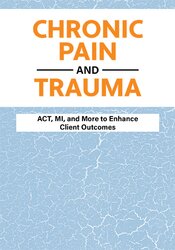
×

Life feels precarious for clients with trauma and chronic pain.
They’ve carved out a way to exist inside a world where everything hurts, and any intervention you make that suggests they go outside their comfort zone gets rejected.
They’re afraid change will be for the worse. I can’t do that, it’ll make my pain worse. I don’t do that, it triggers my PTSD.
Knowing that trauma and chronic pain fuel the feelings of powerlessness and hopelessness that drive addictions and suicidality, you’re afraid of what happens if nothing changes.
Now you can get the support and skills you need to work confidently with clients who are experiencing trauma-related symptoms and chronic pain. Join Benjamin Keizer, PhD, ABPP, chronic pain specialist, as he gives you a blueprint for effective treatment with this complex population. You’ll get:
REGISTER NOW to empower your clients to make meaningful changes today!
All members of the PESI, Inc. planning committee have provided disclosures of financial relationships with ineligible organizations and any relevant non-financial relationships prior to planning content for this activity. None of the committee members had relevant financial relationships with ineligible companies or other potentially biasing relationships to disclose to learners. For speaker disclosures, please see the faculty biography.
Continuing education credit information is coming soon for this live webcast.

Benjamin M. Keizer, PhD, ABPP, is a board-certified clinical health psychologist with extensive post-doctoral training in clinical health psychology at the San Antonio Uniformed Services Health Education Consortium. He serves as the head of Health and Human Performance Psychology at the Center for the Intrepid (CFI), Brooke Army Medical Center, San Antonio, Texas where he provides care for military service members who have sustained serious injuries (e.g., amputation, limb-salvage, multi-trauma, major surgery). In this capacity he serves as both a provider and program director for the Functional Restoration Program for chronic pain and a provider and program manager of the Special Operations Performance and Recovery (SPaR) program. He has been awarded an Army Systems of Health Innovation Grant as a result of excellence in creating novel interdisciplinary programs, and his leadership resulted in a 2018 and 2022 Best of the Best Specialty Care Clinic award from the military and Army Health Systems.
Speaker Disclosures:
Financial: Benjamin Keizer has an employment relationship with the Center for the Intrepid and receives a speaking honorarium from Electromedical Products International. He is a Command Aeromedical Psychologist with the Army Reserve Aviation Command. Benjamin Keizer receives a speaking honorarium and recording royalties from PESI, Inc. All relevant financial relationships with ineligible organizations have been mitigated.
Non-financial: Benjamin Keizer has no relevant non-financial relationships.
For live CE credit, you must watch the live webcast in its entirety at its scheduled time and complete the CE quiz and evaluation within one week. You will have access for 90 days after the program for review.
Please note: There will be a 70-minute lunch and two 15-minute breaks; one in the morning and one in the afternoon. Lunch and break times will be announced by the speaker and at their discretion. A more detailed schedule is available upon request.
Visit our FAQ page at https://www.pesicanada.ca/faq or contact us at https://www.pesicanada.ca/contact-us.
Trauma and Chronic Pain: The Nervous System as Common Denominator
Getting Started and Foundations: Assessment, Case Conceptualization, and Safety Planning
Chronic Pain Treatment Toolbox: Emerging Strategies and Complimentary Approaches
Clinical Considerations
Satisfaction Guarantee
Your satisfaction is our goal and our guarantee. Concerns should be addressed to info@pesicanada.com.
Please wait ...